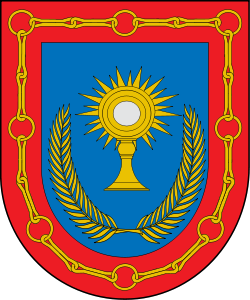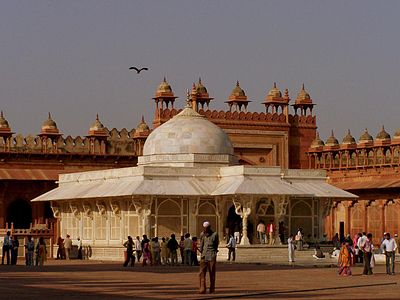- Jerome Xavier
-
Jerome Xavier, born Jerónimo de Ezpeleta y Goñi (1549 in Beire, Navarra (Spain) – June 27, 1617, Goa, (India)), was a Spanish Jesuit missionary in to the Mughal court of Akbar, (1542 - 1605), and his son Jahangir, (1569 - 1627), . Grand-nephew of Saint Francis Xavier he chose to be called Jerome Xavier.
 Coat of Arms of Beire, Navarra with the Christian symbol of the Eucharist and the chains broken by Geant King Sancho VII of Navarre at the The Battle of Las Navas de Tolosa, known in Arab history as the Battle of Al-Uqab (معركة العقاب), July 1212
Coat of Arms of Beire, Navarra with the Christian symbol of the Eucharist and the chains broken by Geant King Sancho VII of Navarre at the The Battle of Las Navas de Tolosa, known in Arab history as the Battle of Al-Uqab (معركة العقاب), July 1212
Contents
Early life
Jerome Xavier was born "in the castle of his father Miguel de Ezpeleta"[1] in the northern province of Navarra, Spain in 1549. Xavier's great-uncle, Saint Francis Xavier,(1506 - 1552), was a closer friend of Ignatius of Loyola, (1491 - 1556), and co-founder of the Society of Jesus.
On May 7, 1568 at the age of nineteen Jerome entered the Society of Jesus upon completion of a degree of Bachelor of Philosophy from the University of Alcalá. He spent the following years studying theology and philosophy before being ordained priest in 1575. Upon his ordination Xavier spent a number of years teaching "elementary subjects"[2] in Villarejo de Fuentes in Cuenca, (central Spain), before being sent east, arriving in Goa in September, 1581.
Missionary work
First years
Upon arrival at the Portuguese Goa Father Jerome was "appointed as master of novices"[3] but quickly had to relinquish the position due to illness "as a consequence of the difficult sea-voyage and the troubles of acclimatization".[4] Following his recovery Xavier began work on a Portuguese translation of Father Alessandro Valignano's History of the Jesuits in India.
In early 1584 Xavier was installed as the Rector of the Bassein College, though poor health hampered his duty once again and forced him to be transferred to the "more favorable climate"[5] of Cochin where he occupied the same position from 1586 to 1592. Around this time Father Xavier was appointed as the Superior of the Professed House of Goa, though election to his new position further strained tense relations between the Portuguese and Spanish in the Oriental colony. The tension of a Castillian ruling a Portuguese population was eased when Mughal Emperor Akbar, (1542 - 1605), called for the third mission of Jesuit priests to his court[6] and Father Jerome was sent, by popular election, to Lahore where he arrived on May 5, 1595.
 : The Mughal Empire at Akbar's death in 1605. Fully integrated territories in dark green, dependent territories in light green
: The Mughal Empire at Akbar's death in 1605. Fully integrated territories in dark green, dependent territories in light green
In the court of Akbar
Father Jerome's arrival in Lahore was marked by the hospitality of Akbar who provided Xavier and his two companions, Father Emmanuel Pinheiro and Brother Benedict de Goes, with lodgings in his own palace and "assigned a Muslim doctor to instruct them"[7] in learning the Persian language".
During the reign of Akbar, Father Jerome accompanied the Emperor on various expeditions through the Deccan Plateau witnessing the capture of the fortress as Asirgarh in January 1601.[8]
During the conquest Akbar moved his permanent residence to Agra providing stability that allowed Father Jerome to "devote much of his time to the creation of a Christian religious literature written in the Persian tongue".[9]
It was approximately during this time that more Jesuit missionaries began to arrive to replace Father Emmanuel and Brother Benedict who had been sent to explore on the central route leading to China (the search of Cathay) and that the greatest accomplishment of Father Jerome and the Jesuits under Emperor Akbar was achieved.
While Xavier was accompanying the army and his two original companions sent elsewhere he was notified by Father Francesco Corsi, (1573 - 1635), of the declining atmosphere of religious freedom in Lahore under the "intolerant attitude of the Viceroy"[10] put in place by Akbar. Immediately Father Jerome requested that the Emperor send the more experienced Father Pinheiro back to Lahore as was as issuing a farmān "granting freedom of worship"[11] to the Christians. This is significant largely because Akbar had denied previous requests by the missionaries to "strengthen the position of the mission"[12] in more of an authoritative way within the Islamic Empire.
Xavier and the Emperor often debated topics regarding religion. The most frequent of which was of Akbar's disbelief in the divinity of Christ. While the Conversion of the Emperor seemed unlikely, Xavier "entertained great hopes"[13] for the conversion of his son Salīm, born 1569, called Salim as a sign of respect towards Sheikh Sufi Mystic Salim Chishti (1478 – 1572) whose daughter nursed Salim as a child, and descendant of the famous Khawaja Moinuddin Chishti, (1141 - 1230), whose tomb/Dargha is in Ajmer, Rajasthan.
 Sheikh and Sufi Mystic Salim Chishti, (1478 - 1572), whose Dargha/ Shrine is located at Fatehpur Sikri, Uttar Pradesh, India, inspired 3rd Emperor Akbar to give the name Salim to his first son, later 4th Emperor Jahangir
Sheikh and Sufi Mystic Salim Chishti, (1478 - 1572), whose Dargha/ Shrine is located at Fatehpur Sikri, Uttar Pradesh, India, inspired 3rd Emperor Akbar to give the name Salim to his first son, later 4th Emperor Jahangir
In the court of Jahāngīr
Prince Salīm took the name Jahangir when he took the throne and his attitude towards Christian missionaries and a discourse on religion within his court was similar to that of his father. Low conversion rates continued though "Xavier attended...audiences [at Lahore] throwing the hook into the water, hoping the fish will bite".[14] The most notable of all conversions during Father Jerome's charge of the mission was the conversion and baptism of three nephews of Jahangir in the summer of 1610.
This conversion was short lived as in 1613 "the princes apostatized and gave their crucifixes [given to them at upon their baptism] back to the Jesuits".[15] This act confirmed Father Jerome's growing pessimism about his mission among the "hardness of the Muslims and...motives of the converts".[16] The Father's doubts of the effectiveness of his mission were further confirmed as war broke out between the Portuguese and Mughal Empires in the autumn of 1613.
During the conflict Xavier had to protect the possessions of the church by storing them "in the home of a poor Christian".[17] As the war progressed safety became a concern for Father Jerome, who moved the Mission and its congregation from Lahore to Agra in 1614.[18] While the "end of the mission seemed evident"[19] peace was restored in 1615 and the mission resumed its pre-war activity though without Father Jerome, who for the first time since his departure, returned to Goa "a broken man".[20]
Final years and death
The final years of Father Jerome's life were spent in retirement in Goa. He was once again assigned as Rector, this time at St. Paul's College and desired greatly to return to Spain though he did not possess the "health and strength required for the labours of that country".[21] He reflected that he was "on death's door"[22] and on June 27, 1617 "he was found burned to death in his room"[23] under circumstances that are not known to this day. Unknown to him at the time of his death, Father Xavier had been elected to serve as the Archbishop of Cranganore.
Some references
- Sir Edward Maclagan, KCSI, KCIE, (1864 - 1952), The Jesuits and the Great Mogul, Ed. Burns, Oates & Washbourne, London, (1932), 433 pages, ISBN, 9780374952485. Reprint by Octagon Press, New York, (1972),
- Charles E. O'Neill, Joaquín María Domínguez , Diccionario histórico de la Compañía de Jesús: biográfico-temático, Volumen 4 Institutum Historicum, (2001) - 4110 pages. Univ. Pontificia de Comillas, ISBN 8484680363, ISBN 9788484680369
- Jahangir and the Jesuits From Fernão Guerreiro, Publisher: London : Routledge Curzon, (2005). ISBN: 0415344824 DDC: 266.25409031 . Facsimile reproduction of: Jahangir and the Jesuits: with an accountof the travels of Bento de Gois and the mission to Pegu, from the Relations of Fernão Guerreiro / translated by C. H. Payne. London : George Routledge & Sons, (1930).
Footnotes
- ^ Camps, Arnulf, Jerome Xavier S.J. and the Muslims of the Mogul Empire: Controversial Works and Missionary Activity, Nouvelle Revue de Science Missionaire, Switzerland, 1957, p. 2.
- ^ Ibid., p. 3.
- ^ Ibid., p. 3.
- ^ Ibid., p. 3.
- ^ Ibid., p. 3.
- ^ Ibid., p. 4.
- ^ Ibid., p. 5.
- ^ Ibid., p. 5.
- ^ Ibid., p.6.
- ^ Ibid., p. 7.
- ^ Ibid., p. 7.
- ^ Ibid., p. 7.
- ^ Ibid., p. 7.
- ^ Ibid., p. 8.
- ^ Ibid., p. 10.
- ^ Ibid., p. 10.
- ^ Ibid., p. 11.
- ^ Ibid., p. 11.
- ^ Ibid., p. 12.
- ^ Ibid., P. 12.
- ^ Ibid., p. 12.
- ^ Ibid., p. 12.
- ^ Ibid., p.12.
Categories:- 1549 births
- 1617 deaths
- Spanish Jesuits
- Spanish missionaries
- Indian Jesuits
Wikimedia Foundation. 2010.
